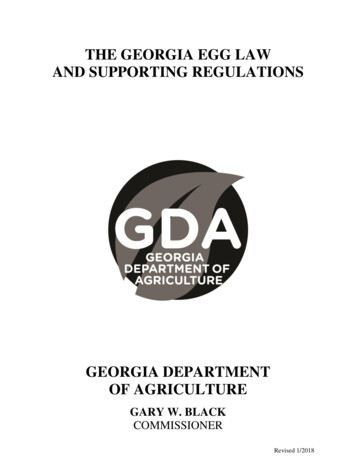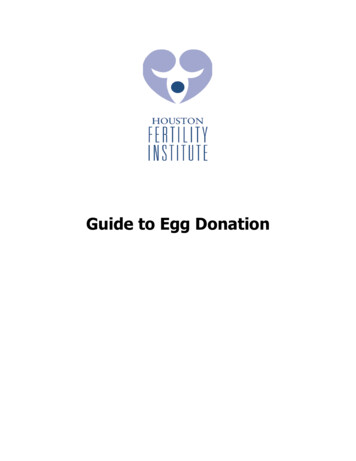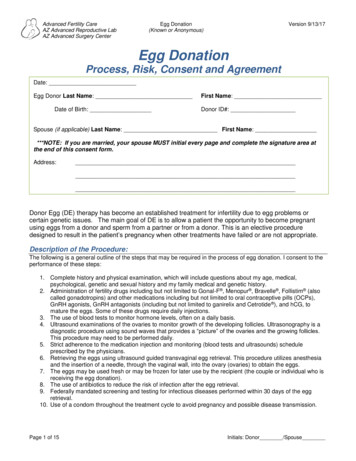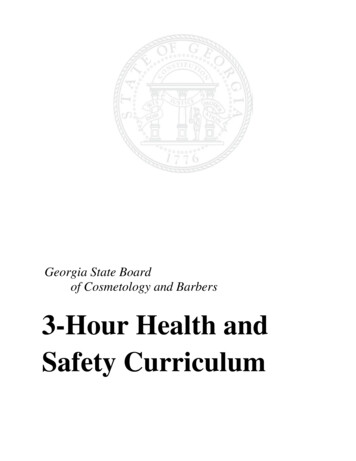
Transcription
THE GEORGIA EGG LAWAND SUPPORTING REGULATIONSGEORGIA DEPARTMENTOF AGRICULTUREGARY W. BLACKCOMMISSIONERRevised 1/2018
The Georgia Egg LawAnd Supporting RegulationsFood Safety DivisionGeorgia Department of AgricultureCONTENTSTHE OFFICAL CODE OF GEORGIATITLE 26, CHAPTER 2, ARTICLE 8: 1CLASSIFICATION OF EGGS226-2-262REGISTRATION OF ENTITIES DEALING IN EGGS426-2-263LICENSE REQUIRED FOR WHOLESALER OR EGG HANDLER; GROUNDS FORSUSPENSION OR REVOCATION; TRANSFERABILITY; EXEMPTION426-2-264SALES BY ENTITIES DEALING IN EGGS; EXEMPTION OF PRODUCERS FROMTAXATION AND LICENSING426-2-265DEALER’S INVOICES OF SALES TO BE FURNISHED TO DEPARTMENT OFAGRICULTURE ON REQUEST; EXCEPTION FOR SALES TO CONSUMERS426-2-266INSPECTORS AND ASSISTANTS; CONFISCATION AND DESTRUCTION OF EGGSFOUND UNFIT FOR HUMAN CONSUMPTION526-2-267PROMULGATION OF RULES, REGULATIONS, GRADES, AND STANDARDS; POWERSOF INSPECTORS526-2-268INFORMATION LABELS AFFIXED TO CASES OF EGGS526-2-269PLACARD TO BE DISPLAYED; CONTENTS626-2-270RECIPROCAL MARKETING AGREEMENT TO VARY LABELING REQUIREMENTS626-2-271“WITHHOLD FROM SALE ORDERS”; COST OF INSPECTION AND RELEASE626-2-272LICENSING OF CANDLERS AND GRADERS OF EGGS; PROMULGATION OF RULESAND REGULATIONS REGARDING QUALIFICATIONS; TEMPORARY WORKWITHOUT LICENSE626-2-273REFRIGERATION AND OTHER HANDLING REQUIREMENTS726-2-274PENALTY; DUTY OF PROSECUTING ATTORNEYS TO PROSECUTE VIOLATIONS7DEPARTMENT OF AGRICULTURE REGULATIONSCHAPTER 40-3: EGG INSPECTIONCitationRegulationsPage40-3-1-.01OPEN DATING ONEGG CASES AND EGG CARTONS40-3-1-.02INSPECTION OF EGGS840-3-1-.03UNFIT EGGS940-3-1-.04DETERMINING VIOLATOR OF THE GEORGIA EGG LAW AND THE RULES ANDREGULATIONS940-3-2-.01EGG PROCESSING PLANTS, ETC.940-3-3-.01EGG BREAKING ROOM SANITATION918
The Georgia Egg LawAnd Supporting RegulationsFood Safety DivisionGeorgia Department of AgricultureTITLE 26. FOOD, DRUGS, AND COSMETICSCHAPTER 2. STANDARDS, LABELING, AND ADULTERATION OF FOODARTICLE 8. EGGS§ 26-2-260. DEFINITIONSAs used in this article, the term:(1) "Cold storage" means protected storage in a refrigerated place.(2) "Commerce" means interstate, foreign, or intrastate commerce.(3) "Commissioner" means the Commissioner of Agriculture of the State of Georgia.(4) "Department" means the Department of Agriculture of the State of Georgia.(5) "Egg" means the shell egg of the domesticated chicken, turkey, duck, goose, or guinea.(6) "Egg handler" means any person who engages in any business in COMMERCE which involvesbuying or selling any EGGs, as a poultry producer or otherwise, processing any EGG PRODUCTs, orotherwise using any EGGs in the preparation of human food.(7) "Egg product" means any dried, frozen, or liquid EGGs, with or without added ingredients, exceptproducts which contain EGGs only in a relatively small proportion or which historically have not beenconsidered by consumers as products of the EGG food industry.(8) "Quality" means the inherent properties of any product which determine its relative degree ofexcellence.(9) "Wholesaler" means any person, firm, corporation, association, dealer, or broker selling oroffering for sale, in or into this state, more than five cases of EGGs in any one week.§ 26-2-261. CLASSIFICATION OF EGGS(a) Within the intent and purpose of this article, EGGs classified as:(1) Storage EGGs shall be construed to mean EGGs which have been in COLD STORAGE for a period of31 days or longer; and(2) Fresh EGGs shall be construed to mean EGGs which have been held in COLD STORAGE not longerthan 30 days from the date they were packed.(b) Each container of EGGs must be labeled to show size or weight class and standard of QUALITY.(c) All EGGs sold or offered for sale by dealers, as designated by this article, shall be graded as to netweight and standards of QUALITY.(1) The size or weight classes shall be:2
The Georgia Egg LawAnd Supporting RegulationsFood Safety DivisionGeorgia Department of AgricultureMINIMUM NET WEIGHTSize orWeightClassesJumboExtra LargeLargeMediumSmallPee WeeMinimum Net Wt.Per Doz. (Oz.)For Indv. Eggsat Rate Per Doz. (Oz.)Min. Net Wt.Per 30 Doz. (Lbs.)3027242118152926232017145650 ½4539 ½3428The weight tolerance, per dozen, where EGGs are sold at retail, shall be not more than two EGGs ofthe minimum net weight for individual EGGs at the rate per dozen. Not more than 5 percenttolerance of the minimum net weight for individual EGGs at the rate per dozen shall be allowedwhere EGGs are sold in wholesale lots.(2) The QUALITY classifications for individual EGGs shall be:(A) Grade AA:(i) Shell: clean, unbroken, practically normal.(ii) Air cell: one-eighth inch or less in depth, unlimited movement, and free or bubbly.(iii) Yolk: outline slightly defined, practically free from defects.(iv) White: firm, clear.(B) Grade A:(i) Shell: clean, unbroken, practically normal.(ii) Air cell: three-sixteenths inch or less in depth, unlimited movement, and free or bubbly.(iii) Yolk: outline fairly well defined, practically free from defects.(iv) White: reasonably firm, clear.(C) Grade B:(i) Shell: clean to slightly stained (but not more than one thirty-second of surface if localized orone-sixteenth of surface if scattered), unbroken, abnormal.(ii) Air cell: over three-sixteenths inch in depth, unlimited movement, and free or bubbly.(iii) Yolk: outline plainly visible, enlarged and flattened, clearly visible germ development but noblood, other serious defects.(iv) White: weak and watery, small blood and meat spots present (but not more than one-eighth inchin diameter aggregate).3
The Georgia Egg LawAnd Supporting RegulationsFood Safety DivisionGeorgia Department of Agriculture(d) The U.S. Standards, Grades, and Weight Classes for Shell Eggs, Part 56, Subpart C, Paragraphs56,216 and 56,217 established pursuant to the federal Agricultural Marketing Act of 1946 are adopted byreference.(e) All of the classifications indicated in this Code section shall be determined by candling.§ 26-2-262. REGISTRATION OF ENTITIES DEALING IN EGGSAll WHOLESALERs, commission merchants, brokers, retailers, and dealers of any kind or character whodesire to sell or offer EGGs for sale in this state shall first file with the COMMISSIONER of Agriculture,upon forms furnished by the COMMISSIONER, the name of the firm or person desiring to offer EGGs forsale either by themselves or by their agent, together with the address of said firm or person and the type orkind of EGGs to be offered for sale.§ 26-2-263. LICENSE REQUIRED FOR WHOLESALER OR EGG HANDLER; GROUNDS FORSUSENSION OR REVOCATION; TRANSFERABILITY; EXEMPTION(a) It shall be unlawful for any person to engage in business as a WHOLESALER or as an EGG HANDLERwithout first obtaining a license from the COMMISSIONER. No license issued under this article shall besuspended or revoked except for health and sanitation reasons or violations of this article and until thelicensee to be affected shall be provided with reasonable notice thereof and an opportunity for hearing, asprovided under Chapter 13 of Title 50, known as the "Georgia Administrative Procedure Act." Licensesissued under this article shall be valid until suspended or revoked and shall not be transferable withrespect to persons or location. There shall be no fee for such license.(b) Food sales establishments licensed under Article 2 of this chapter, known as the "Georgia Food Act,"and shell EGG HANDLERs registered under the United States Department of Agriculture shell eggsurveillance inspection program shall be exempt from the provisions of subsection (a) of this Codesection.§ 26-2-264. SALES BY ENTITIES DEALING IN EGGS; EXEMPTION OF PRODUCERS FROMTAXATION AND LICENSINGIt shall be unlawful for any WHOLESALER, commission merchant, broker, retailer, or dealer of EGGs,either by himself or by his agent, to offer for sale in this state any EGGs if this article has not beencomplied with, provided that nothing in this Code section shall be construed to repeal the exemptiongiven the producer in the sale of commodities of his own production from taxation and licensing byexisting laws.§ 26-2-265. DEALER’S INVOICES OF SALES TO BE FURNISHED TO DEPARTMENT OFAGRICULTURE ON REQUEST; EXCEPTION FOR SALES TO CONSUMERSAll dealers, wholesale or retail, shall be required to furnish to the DEPARTMENT of Agriculture uponrequest a copy of the invoice of each sale of EGGs, the copy of invoice to show the person or firm towhom the sale was made, the address of such person or firm, and the kind and quantity involved in suchsale, provided that nothing contained in this Code section shall be construed to require the filing of a copyof the invoice of a sale to a consumer.4
The Georgia Egg LawAnd Supporting RegulationsFood Safety DivisionGeorgia Department of Agriculture§ 26-2-266. INSPECTORS AND ASSISTANTS; CONFISCATION AND DESTRUCTION OFEGGS FOUND UNFIT FOR HUMAN CONSUMPTION(a) The COMMISSIONER of Agriculture shall instruct the agricultural sanitarians and agriculturalinspectors of the DEPARTMENT of Agriculture to carry out this article. The COMMISSIONER is authorizedin his discretion to select and appoint such other additional assistants as in his judgment he deemsnecessary to enforce this article.(b) All such employees of the DEPARTMENT of Agriculture are authorized to confiscate and destroy allEGGs found to be unfit for human consumption.§ 26-2-267. PROMULGATION OF RULES, REGULATIONS, GRADES, AND STANDARDS;POWERS OF INSPECTORSThe COMMISSIONER of Agriculture is authorized to promulgate, issue, and set up such additional rules,regulations, grades, standards, or otherwise as in his judgment are necessary to carry out the intent andpurpose of this article. The sanitarians and inspectors authorized in Code Section 26-2-266 are authorizedto exercise all the authority, powers, and privileges now delegated to the duly authorized food inspectorsof the DEPARTMENT of Agriculture by existing law.§ 26-2-268. INFORMATION LABELS AFFIXED TO CASES OF EGGS(a) At the time of packing and candling of each case of EGGs, the producer or dealer shall affix a labelnot less than two inches by four inches or not less than eight square inches on one end of each case and onthis label shall be legibly printed or stamped, in letters not less than one-fourth of an inch in size, the datewhen the EGGs were packed and candled or the expiration date, which shall not exceed 45 days from thedate packed; the size and grade of the EGGs; and either the name and address of the packer or theU.S.D.A. assigned plant number or a state approved plant identification code. The name of the state oforigin may be given. When EGGs are sold in cartons, the cartons must show the date packed or theexpiration date, which shall not exceed 45 days from the date packed, and the grade and size, togetherwith either the name and address of the packer or the U.S.D.A. assigned plant number or a state approvedplant identification code. The state of origin may also be given.(b) Abbreviations of any words in the classification or in designating the grade and size shall not bepermitted. The information pertaining to the grade and size shall be shown in legible letters not less thanone-fourth of an inch in size. The information pertaining to the name and address of the packer or theU.S.D.A. assigned plant number or a state approved plant identification code and the date packed orexpiration date shall be legibly given. All wording on EGG cases and EGG cartons must be in the Englishlanguage and must have prior approval from the Georgia Department of Agriculture before using.(c) Words or phrases tending to becloud or nullify the proper classification of EGGs shall not bepermitted. Each word of the classification, including the name of the state of origin, shall appear in thesame size type and color in any printed advertisement. Abbreviations of any word in the classification orin designating the size and grade to which EGGs belong shall not be permitted. Every person advertisingEGGs for sale, at retail or wholesale, in newspapers, by window displays, or otherwise shall set forth in theadvertisement the classification as to size and grade of the EGGs offered for sale. The classification shallbe set forth in letters equal in size to those advertising the EGGs for sale.5
The Georgia Egg LawAnd Supporting RegulationsFood Safety DivisionGeorgia Department of Agriculture§ 26-2-269. PLACARD TO BE DISPLAYED; CONTENTSAll EGGs offered for sale at retail shall be properly classified in accordance with the followingspecifications:(1) A heavy cardboard or placard, not less than eight by eleven inches, shall be conspicuouslydisplayed at all times on or over each receptacle containing EGGs offered for sale, setting forth in lettersnot less than one inch in height, plainly and legibly, the classification as to QUALITY and weight;(2) The name of the state of origin of EGGs may appear on the placard;(3) The placard shall not be required when EGGs are packed in properly labeled cartons. The EGGstherein shall be required to come up to the standard as placarded; and(4) Restaurants, hotels, or other eating places shall be required to display a placard where it can beeasily seen by customers or, in lieu thereof, to place this information on the menu.§ 26-2-270. RECIPROCAL MARKETING AGREEMENT TO VARY LABELINGREQUIREMENTSThe COMMISSIONER of Agriculture is authorized to enter into reciprocal marketing agreements with otherstates to vary the labeling requirements provided in this article. Such agreements shall not vary thestandards of QUALITY and weights provided in this article, it being the purpose and intent of this Codesection to promote and encourage interstate marketing of EGGs and to authorize variations of labeling asrequired in this article where such variations will promote and encourage the marketing of EGGs.§ 26-2-271. “WITHHOLD FROM SALE ORDERS”; COST OF INSPECTION AND RELEASE(a) Inspectors or sanitarians of the Department of Agriculture, upon determining that this article or therules and regulations promulgated for its enforcement are being violated, may put "Withhold From SaleOrders" on all EGGs being sold or offered for sale in violation of this article or the regulations thereof andshall report the circumstances to the COMMISSIONER of Agriculture for his action.(b) EGGs upon which "Withhold From Sale Orders" have been issued shall not be sold or otherwisedisposed of until such "Withhold From Sale Orders" have been canceled by the COMMISSIONER or hisduly authorized agents. The cost of the inspection and release shall be paid by the offender.§ 26-2-272. LICENSING OF CANDLERS AND GRADERS OF EGGS; PROMULGATION OFRULES AND REGULATIONS REGARDING QUALIFICATIONS; TEMPORARY WORKWITHOUT LICENSEEach candler and grader of EGGs offered for sale shall obtain a license from the DEPARTMENT ofAgriculture at no cost, after demonstrating to the satisfaction of the DEPARTMENT his capability andqualifications as an EGG candler and grader. The COMMISSIONER of Agriculture is authorized to establishby rule and regulation the minimum qualifications for EGG candlers and graders. With the approval of theCOMMISSIONER, any person may candle and grade EGGs not to exceed 14 days, pending licensing by theDEPARTMENT, provided that during this period the employer of such temporary candler and grader shallbe accountable for the actions of such candler and grader while acting in such capacity.6
The Georgia Egg LawAnd Supporting RegulationsFood Safety DivisionGeorgia Department of Agriculture§ 26-2-273. REFRIGERATION AND OTHER HANDLING REQUIREMENTS(a) All shell EGG producers shall refrigerate EGGs upon gathering such EGGs. EGGs shall be graded andpacked within a reasonable period of time from gathering.(b) After washing, processing, and packaging, EGGs shall be transported, stored, and displayed at anambient temperature not to exceed 45 degrees Fahrenheit until sold at retail or used by any commercialestablishment or public institution.§ 26-2-274. PENALTY; DUTY OF PROSECUTING ATTORNEYS TO PROSECUTEVIOLATIONSAny person, firm, or corporation who violates any provisions of this article shall be guilty of amisdemeanor. It shall be the duty of the prosecuting attorney of the appropriate court to prosecute allpersons charged with the violation of this article as soon as the evidence has been transmitted to them bythe COMMISSIONER of Agriculture.7
The Georgia Egg LawAnd Supporting RegulationsFood Safety DivisionGeorgia Department of AgricultureRULESOFGEORGIA DEPARTMENT OF AGRICULTURE40-3 EGG INSPECTIONCHAPTER 40-3-1LABELING, INSPECTION, VIOLATIONS40-3-1-.01 Open Dating on Egg Cases and Egg Cartons. All eggs that are sold, offered for sale orstored for sale at retail or wholesale shall use an OPEN DATE to express the PACKing DATE or theEXPIRATION DATE.(a) Definitions:1. Open Date: Means the use of letters (for the month) together with number(s) (for the day of themonth).2. Pack Date: Means the date the eggs were washed, candled, and packed.3. Expiration Date: Means the last date the eggs shall be sold at retail or wholesale.(b) Manner of Expressing the OPEN DATE: OPEN DATING shall consist of a combination of three letters(for the month abbreviation) and number(s) for the day of the month. Example: JUN 10(c) Manner of Expressing the PACK DATE: A PACK DATE shall be the use of an OPEN DATE (as definedin 40-3-1-.01(b) of these Regulations) with no words, numbers or letters preceding or following theOPEN DATE. Example: JUN 10(d) Manner of Expressing the EXPIRATION DATE: An EXPIRATION DATE shall be the use of an OPENDATE (as defined in 40-3-1-.01(b) of these Regulations) preceded by the abbreviation "Exp." [Example:EXP Jun 10] or the use of an OPEN DATE (as defined in 40-3-1-.01(b) of these Regulations) preceded bythe term "Sell By" [Example: Sell by JUN 10], or "Not to be Sold After" [Example: Not to be SoldAfter JUN 10]; or "Best Before" [Example: Best Before JUN 10] or words of similar import. TheEXPIRATION DATE shall not exceed 45 days from the date packed.(e) Prohibited Acts: The following acts and the causing thereof are hereby prohibited.1. Eggs are not to be sold or offered for sale at retail or wholesale after the EXPIRATION DATE.2. Eggs are not to be sold or offered for sale that do not meet the U.S. Standards, Grades, andWeight Classes for Shell Eggs Part 56, Subpart C, Paragraphs 56.216 and 56.217 established pursuantto the Federal Agricultural Marketing Act of 1946.40-3-1-.02 Inspection of Eggs. The Commissioner of Agriculture, or his authorized representative, shallhave the authority, right and privilege to enter the place of business of any wholesaler, retailer,warehouse, cold storage house, or other storage places, trucks or carriers where eggs are stored andinspect any eggs therein; and, shall have the right and privilege to inspect all books, records and invoicesthat, in their judgement, would enable them to make a more accurate examination or inspection of eggs.8
The Georgia Egg LawAnd Supporting RegulationsFood Safety DivisionGeorgia Department of Agriculture40-3-1-.03 Unfit Eggs. No person shall sell, offer or expose for sale, or have in his possession for sale,eggs for human consumption that are inedible or adulterated. Eggs that are filthy, putrid, decomposed, orotherwise unfit for food in whole or in part, shall be deemed to be adulterated. Eggs which contain blackrots, white rots, mixed rots, (addled eggs), sour eggs with green whites, eggs with stuck yolks, moldyeggs, eggs showing blood rings, eggs containing embryo chicks (at or beyond the blood ring stage), orany other eggs that are filthy, decomposed, or putrid shall be deemed to be inedible.40-3-1-.04 Determining Violator of the Georgia Egg Law and the Rules and Regulations.(1) For the purpose of determining who is responsible for a violation of Section 26-2-261 of the OfficialCode of Georgia Annotated it will be presumed that a shipment of eggs was of the same grade whendelivered to the retailer as shown by the inspection at the end of a five day period following their deliveryto the seller provided the retailer has kept the eggs until the time of inspection under refrigeration of atemperature of not more than 45 degrees Fahrenheit.(2) The packer will be presumed to be responsible for all labeling and dating on cases and cartons ofeggs.CHAPTER 40-3-2EGG PROCESSING PLANTS40-3-2-.01 Egg Processing Plants, Etc. No person shall operate an egg processing plant, and eggcandling room or an egg breaking plant before the plant has been approved by the Commissioner ofAgriculture or his duly authorized agent.CHAPTER 40-3-3EGG BREAKING ROOM SANITATION40-3-3-.01 Egg Breaking Room Sanitation.(1) Minimum Requirements: Minimum Requirements for Egg Breaking Rooms shall be as follows:(a) The floor shall be constructed of smooth concrete or tile, with proper drainage facilities.(b) The room shall be so constructed as to be equipped with hot and cold running water.(c) The walls shall be so constructed that at least six (6) feet of the wall space, from floor level, shall beconstructed of a washable material.(d) The lighting shall be sufficient and adequate.(e) All openings shall be screened.(f) All equipment shall be of stainless steel, or its equivalent, to assure proper sanitation.(g) Refrigeration shall be adequate to assure standards of quality.9
The Georgia Egg LawAnd Supporting RegulationsFood Safety DivisionGeorgia Department of Agriculture(2) Standards. Frozen egg products shall not be sold or offered for sale in the State of Georgia unlesssuch products conform with the standards established for such products by the Commissioner ofAgriculture.FOR FURTHER INFORMATION, PLEASE CONTACT:GEORGIA DEPARTMENT OF AGRICULTUREFOOD SAFETY DIVISION19 MARTIN LUTHER KING JR DRIVE SWATLANTA, GA 30334404-656-362710
As used in this article, the term: (1) "Cold storage" means protected storage in a refrigerated place. (2) "Commerce" means interstate, foreign, or intrastate commerce. (3) "Commissioner" means the Commissioner of Agriculture of the State of Georgia. (4) "Department" means the Department of Agriculture of the State of Georgia.











